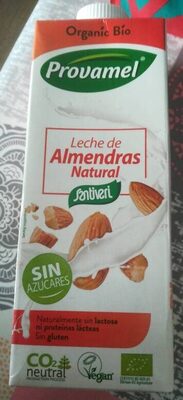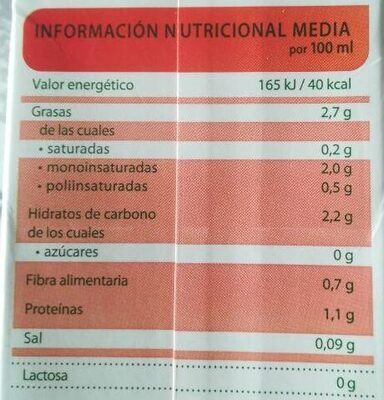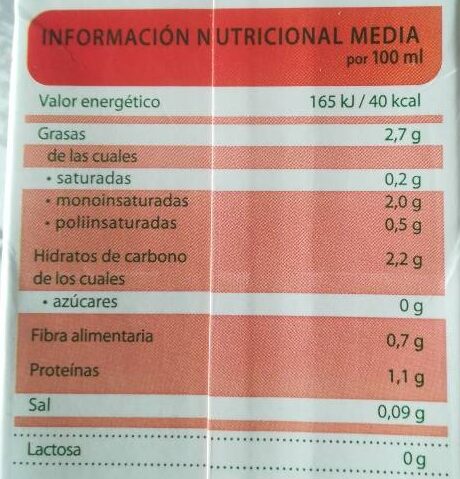Help us make food transparency the norm!
As a non-profit organization, we depend on your donations to continue informing consumers around the world about what they eat.
The food revolution starts with you!
Leche de almendras natural ecológica, sin lactosa, - Provamel
Leche de almendras natural ecológica, sin lactosa, - Provamel
This product page is not complete. You can help to complete it by editing it and adding more data from the photos we have, or by taking more photos using the app for Android or iPhone/iPad. Thank you!
×
Barra-kodea: 5411188124870 (EAN / EAN-13)
Markak: Provamel
Kategoriak: en:Plant-based foods and beverages, en:Beverages, en:Plant-based foods, en:Dairy substitutes, en:Milk substitutes, en:Nuts and their products, en:Plant-based beverages, en:Plant-based milk alternatives, en:Nut-based drinks, en:Almond-based drinks
Etiketak, ziurtagiriak, sariak:
en:No gluten, en:Organic, en:Vegetarian, en:EU Organic, en:Vegan, BE-BIO-01, en:Carbon compensated product, en:CO2e neutral, en:No colorings, The Vegan Society

Saltzen diren herrialdeak: Espainia
Matching with your preferences
Health
Osagaiak
-
11 ingredients
Gaztelania: agua, almendra* (5,5%), maltodextrina de maíz,quot,, estabilizantes (goma garrofín, goma guar*), sal marina, emulgente (lecitina de girasol), *, procedentes de la agricultura ecológica Puede contener trazas de frutos de cáscara (no cacahuetes)Alergenoak: en:NutsAztarnak: en:Nuts
Food processing
-
Ultra processed foods
Elements that indicate the product is in the 4 - Ultra prozesatutako elikagaiak eta edariak group:
- Gehigarria: E322
- Gehigarria: E410 - Algarrobo-goma
- Gehigarria: E412
- Osagaia: Emulsifier
- Osagaia: Maltodextrin
Food products are classified into 4 groups according to their degree of processing:
- Prozesatu gabeko edo ahalik eta gutxien prozesatutako elikagaiak
- Sukaldaritzako osagaiak prozesatu
- Prozesatutako jakiak
- Ultra processed foods
The determination of the group is based on the category of the product and on the ingredients it contains.
Gehigarriak
-
E322
Lecithin: Lecithin -UK: , US: , from the Greek lekithos, "egg yolk"- is a generic term to designate any group of yellow-brownish fatty substances occurring in animal and plant tissues, which are amphiphilic – they attract both water and fatty substances -and so are both hydrophilic and lipophilic-, and are used for smoothing food textures, dissolving powders -emulsifying-, homogenizing liquid mixtures, and repelling sticking materials.Lecithins are mixtures of glycerophospholipids including phosphatidylcholine, phosphatidylethanolamine, phosphatidylinositol, phosphatidylserine, and phosphatidic acid.Lecithin was first isolated in 1845 by the French chemist and pharmacist Theodore Gobley. In 1850, he named the phosphatidylcholine lécithine. Gobley originally isolated lecithin from egg yolk—λέκιθος lekithos is "egg yolk" in Ancient Greek—and established the complete chemical formula of phosphatidylcholine in 1874; in between, he had demonstrated the presence of lecithin in a variety of biological matters, including venous blood, in human lungs, bile, human brain tissue, fish eggs, fish roe, and chicken and sheep brain. Lecithin can easily be extracted chemically using solvents such as hexane, ethanol, acetone, petroleum ether, benzene, etc., or extraction can be done mechanically. It is usually available from sources such as soybeans, eggs, milk, marine sources, rapeseed, cottonseed, and sunflower. It has low solubility in water, but is an excellent emulsifier. In aqueous solution, its phospholipids can form either liposomes, bilayer sheets, micelles, or lamellar structures, depending on hydration and temperature. This results in a type of surfactant that usually is classified as amphipathic. Lecithin is sold as a food additive and dietary supplement. In cooking, it is sometimes used as an emulsifier and to prevent sticking, for example in nonstick cooking spray.Source: Wikipedia (Ingeles)
-
E322i - Lezitina
Lecithin: Lecithin -UK: , US: , from the Greek lekithos, "egg yolk"- is a generic term to designate any group of yellow-brownish fatty substances occurring in animal and plant tissues, which are amphiphilic – they attract both water and fatty substances -and so are both hydrophilic and lipophilic-, and are used for smoothing food textures, dissolving powders -emulsifying-, homogenizing liquid mixtures, and repelling sticking materials.Lecithins are mixtures of glycerophospholipids including phosphatidylcholine, phosphatidylethanolamine, phosphatidylinositol, phosphatidylserine, and phosphatidic acid.Lecithin was first isolated in 1845 by the French chemist and pharmacist Theodore Gobley. In 1850, he named the phosphatidylcholine lécithine. Gobley originally isolated lecithin from egg yolk—λέκιθος lekithos is "egg yolk" in Ancient Greek—and established the complete chemical formula of phosphatidylcholine in 1874; in between, he had demonstrated the presence of lecithin in a variety of biological matters, including venous blood, in human lungs, bile, human brain tissue, fish eggs, fish roe, and chicken and sheep brain. Lecithin can easily be extracted chemically using solvents such as hexane, ethanol, acetone, petroleum ether, benzene, etc., or extraction can be done mechanically. It is usually available from sources such as soybeans, eggs, milk, marine sources, rapeseed, cottonseed, and sunflower. It has low solubility in water, but is an excellent emulsifier. In aqueous solution, its phospholipids can form either liposomes, bilayer sheets, micelles, or lamellar structures, depending on hydration and temperature. This results in a type of surfactant that usually is classified as amphipathic. Lecithin is sold as a food additive and dietary supplement. In cooking, it is sometimes used as an emulsifier and to prevent sticking, for example in nonstick cooking spray.Source: Wikipedia (Ingeles)
-
E410 - Algarrobo-goma
Locust bean gum: Locust bean gum -LBG, also known as carob gum, carob bean gum, carobin, E410- is a thickening agent and a gelling agent used in food technology.Source: Wikipedia (Ingeles)
-
E412
Guar gum: Guar gum, also called guaran, is a galactomannan polysaccharide extracted from guar beans that has thickening and stabilizing properties useful in the food, feed and industrial applications. The guar seeds are mechanically dehusked, hydrated, milled and screened according to application. It is typically produced as a free-flowing, off-white powder.Source: Wikipedia (Ingeles)
Ingredients analysis
-
en:Palm oil free
No ingredients containing palm oil detected
Unrecognized ingredients: es:quot, es:no-cacahuetesSome ingredients could not be recognized.
We need your help!
You can help us recognize more ingredients and better analyze the list of ingredients for this product and others:
- Edit this product page to correct spelling mistakes in the ingredients list, and/or to remove ingredients in other languages and sentences that are not related to the ingredients.
- Add new entries, synonyms or translations to our multilingual lists of ingredients, ingredient processing methods, and labels.
If you would like to help, join the #ingredients channel on our Slack discussion space and/or learn about ingredients analysis on our wiki. Thank you!
-
en:Vegan
No non-vegan ingredients
Unrecognized ingredients: es:quot, es:no-cacahuetesSome ingredients could not be recognized.
We need your help!
You can help us recognize more ingredients and better analyze the list of ingredients for this product and others:
- Edit this product page to correct spelling mistakes in the ingredients list, and/or to remove ingredients in other languages and sentences that are not related to the ingredients.
- Add new entries, synonyms or translations to our multilingual lists of ingredients, ingredient processing methods, and labels.
If you would like to help, join the #ingredients channel on our Slack discussion space and/or learn about ingredients analysis on our wiki. Thank you!
-
en:Vegetarian
No non-vegetarian ingredients detected
Unrecognized ingredients: es:quot, es:no-cacahuetesSome ingredients could not be recognized.
We need your help!
You can help us recognize more ingredients and better analyze the list of ingredients for this product and others:
- Edit this product page to correct spelling mistakes in the ingredients list, and/or to remove ingredients in other languages and sentences that are not related to the ingredients.
- Add new entries, synonyms or translations to our multilingual lists of ingredients, ingredient processing methods, and labels.
If you would like to help, join the #ingredients channel on our Slack discussion space and/or learn about ingredients analysis on our wiki. Thank you!
-
Details of the analysis of the ingredients
We need your help!
Some ingredients could not be recognized.
We need your help!
You can help us recognize more ingredients and better analyze the list of ingredients for this product and others:
- Edit this product page to correct spelling mistakes in the ingredients list, and/or to remove ingredients in other languages and sentences that are not related to the ingredients.
- Add new entries, synonyms or translations to our multilingual lists of ingredients, ingredient processing methods, and labels.
If you would like to help, join the #ingredients channel on our Slack discussion space and/or learn about ingredients analysis on our wiki. Thank you!
es: agua, almendra 5.5%, maltodextrina de maíz, quot, estabilizantes (goma garrofín, goma guar), sal marina, emulgente (lecitina de girasol, no cacahuetes)- agua -> en:water - vegan: yes - vegetarian: yes - ciqual_food_code: 18066 - percent_min: 77.8 - percent_max: 94.5
- almendra -> en:almond - vegan: yes - vegetarian: yes - ciqual_food_code: 15041 - percent_min: 5.5 - percent: 5.5 - percent_max: 5.5
- maltodextrina de maíz -> en:corn-maltodextrin - vegan: yes - vegetarian: yes - percent_min: 0 - percent_max: 5.5
- quot -> es:quot - percent_min: 0 - percent_max: 5.5
- estabilizantes -> en:stabiliser - percent_min: 0 - percent_max: 5.5
- goma garrofín -> en:e410 - vegan: yes - vegetarian: yes - percent_min: 0 - percent_max: 5.5
- goma guar -> en:e412 - vegan: yes - vegetarian: yes - percent_min: 0 - percent_max: 2.75
- sal marina -> en:sea-salt - vegan: yes - vegetarian: yes - ciqual_food_code: 11082 - percent_min: 0 - percent_max: 0.1
- emulgente -> en:emulsifier - percent_min: 0 - percent_max: 0.1
- lecitina de girasol -> en:sunflower-lecithin - vegan: yes - vegetarian: yes - percent_min: 0 - percent_max: 0.1
- no cacahuetes -> es:no-cacahuetes - percent_min: 0 - percent_max: 0.1
Elikadura
-
Good nutritional quality
⚠ ️Warning: the amount of fruits, vegetables and nuts is not specified on the label, it was estimated from the list of ingredients: 5This product is not considered a beverage for the calculation of the Nutri-Score.
Positive points: 0
- Proteinak: 0 / 5 (balioa: 1, rounded value: 1)
- Fiber: 0 / 5 (balioa: 0.7, rounded value: 0.7)
- Fruits, vegetables, nuts, and colza/walnut/olive oils: 0 / 5 (balioa: 5.5, rounded value: 5.5)
Negative points: 0
- Energia: 0 / 10 (balioa: 121, rounded value: 121)
- Azukreak: 0 / 10 (balioa: 0, rounded value: 0)
- Gantz saturatua: 0 / 10 (balioa: 0.2, rounded value: 0.2)
- Sodioa: 0 / 10 (balioa: 40, rounded value: 40)
The points for proteins are counted because the negative points are less than 11.
Nutritional score: (0 - 0)
Nutri-Score:
-
Nutrient levels
-
Koipe in moderate quantity (2.5%)
What you need to know- A high consumption of fat, especially saturated fats, can raise cholesterol, which increases the risk of heart diseases.
Recommendation: Limit the consumption of fat and saturated fat- Choose products with lower fat and saturated fat content.
-
Gantz-azido ase in low quantity (0.2%)
What you need to know- A high consumption of fat, especially saturated fats, can raise cholesterol, which increases the risk of heart diseases.
Recommendation: Limit the consumption of fat and saturated fat- Choose products with lower fat and saturated fat content.
-
Azukre in low quantity (0%)
What you need to know- A high consumption of sugar can cause weight gain and tooth decay. It also augments the risk of type 2 diabetes and cardio-vascular diseases.
Recommendation: Limit the consumption of sugar and sugary drinks- Sugary drinks (such as sodas, fruit beverages, and fruit juices and nectars) should be limited as much as possible (no more than 1 glass a day).
- Choose products with lower sugar content and reduce the consumption of products with added sugars.
-
Gatz arrunt in low quantity (0.1%)
What you need to know- A high consumption of salt (or sodium) can cause raised blood pressure, which can increase the risk of heart disease and stroke.
- Many people who have high blood pressure do not know it, as there are often no symptoms.
- Most people consume too much salt (on average 9 to 12 grams per day), around twice the recommended maximum level of intake.
Recommendation: Limit the consumption of salt and salted food- Reduce the quantity of salt used when cooking, and don't salt again at the table.
- Limit the consumption of salty snacks and choose products with lower salt content.
-
-
Nutrition facts
Nutrition facts As sold
for 100 g / 100 mlCompared to: en:Almond-based drinks Energia 121 kj
(29 kcal)-% 14 Koipe 2,5 g +% 36 Gantz-azido ase 0,2 g -% 10 Gantz-azido monoasegabe 2 g +% 36 Polyunsaturated fat 0,5 g -% 1 Carbohydrates 0 g -% 100 Azukre 0 g -% 100 Fiber 0,7 g +% 81 Proteina 1 g +% 38 Gatz arrunt 0,1 g -% 7 Fruits‚ vegetables‚ nuts and rapeseed‚ walnut and olive oils (estimate from ingredients list analysis) 5,5 %
Ingurumena
-
Eco-Score B - Ingurumen-eragin txikia
The Eco-Score is an experimental score that summarizes the environmental impacts of food products.→ The Eco-Score was initially developped for France and it is being extended to other European countries. The Eco-Score formula is subject to change as it is regularly improved to make it more precise and better suited to each country.Life cycle analysis
-
Average impact of products of the same category: B (Score: 79/100)
Kategoria: Almond drink not sweet, not fortified, prepacked
Kategoria: Almond drink not sweet, not fortified, prepacked
- PEF environmental score: 0.06 (the lower the score, the lower the impact)
- including impact on climate change: 0.37 kg CO2 eq/kg of product
Stage Impact Agriculture
43.3 %Processing
17.9 %Ontziratzea
16.2 %Transportation
15.6 %Distribution
6.9 %Consumption
0.0 %
Bonuses and maluses
-
Labels with high environmental benefits
Bonus: +15
-
EU Organic
Organic agriculture contributes to preserve biodiversity, climate, water quality and soil fertility.
Organic food is food produced by methods complying with the standards of organic farming and features practices that cycle resources, promote ecological balance, and conserve biodiversity.
-
-
Missing origins of ingredients information
Malus: -5
⚠ ️ The origins of the ingredients of this product are not indicated.
If they are indicated on the packaging, you can modify the product sheet and add them.
If you are the manufacturer of this product, you can send us the information with our free platform for producers.
-
Missing packaging information for this product
Malus: -15
⚠ ️ The information about the packaging of this product is not filled in.⚠ ️ For a more precise calculation of the Eco-Score, you can modify the product page and add them.
If you are the manufacturer of this product, you can send us the information with our free platform for producers.
Eco-Score for this product
-
Impact for this product: B (Score: 74/100)
Produktua: Leche de almendras natural ecológica, sin lactosa, - Provamel
Life cycle analysis score: 79
Sum of bonuses and maluses: -5
Final score: 74/100
-
Carbon footprint
-
Equal to driving 0.2 km in a petrol car
37 g CO² per 100g of product
The carbon emission figure comes from ADEME's Agribalyse database, for the category: Almond drink not sweet, not fortified, prepacked (Source: ADEME Agribalyse Database)
Stage Impact Agriculture
24.4 %Processing
13.2 %Ontziratzea
26.9 %Transportation
31.6 %Distribution
3.9 %Consumption
0.0 %
Ontziratzea
-
Missing packaging information for this product
⚠ ️ The information about the packaging of this product is not filled in.Take a photo of the recycling information Take a photo of the recycling information
Transportation
-
Origins of ingredients
Missing origins of ingredients information
⚠ ️ The origins of the ingredients of this product are not indicated.
If they are indicated on the packaging, you can modify the product sheet and add them.
If you are the manufacturer of this product, you can send us the information with our free platform for producers.Add the origins of ingredients for this product Add the origins of ingredients for this product
Etiketak
-
EU Organic
Organic agriculture contributes to preserve biodiversity, climate, water quality and soil fertility.
Organic food is food produced by methods complying with the standards of organic farming and features practices that cycle resources, promote ecological balance, and conserve biodiversity.
Report a problem
-
Incomplete or incorrect information?
Category, labels, ingredients, allergens, nutritional information, photos etc.
If the information does not match the information on the packaging, please complete or correct it. Open Food Facts is a collaborative database, and every contribution is useful for all.
Datuen iturria
Product added on by elcoco
Last edit of product page on by cloii9.
Produktuaren orria -gatik editatua elcoco.8ee0f951c971372c2277a09bd4c808a4, inf, kiliweb, mariacastiel, moon-rabbit, openfoodfacts-contributors, roboto-app, stephane, worldtest, yuka.UUlJSkRxSU1tc1FQb2ZZOC9VL2YxdTVSeEw2TlEycWxBY2dwSVE9PQ, yuka.V1lrY0ZiUmNuZFFEa3ZRczFURDR3TUJad3JLS2VrV0dPY1pCSUE9PQ, yuka.WVpBUE1QMGk5dWtrdGR0am95cmw0SWhmeXB1SFkwNjRKZGNlSWc9PQ, yuka.YUpnR0Q0a0x2YU1YdS9KbjBnK0x3TXR0dzdINWRFS09Pc0V6SUE9PQ.











